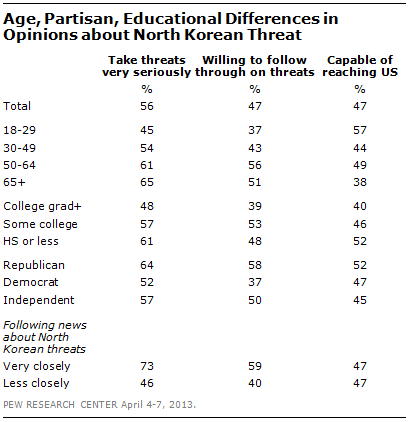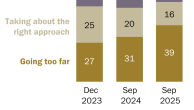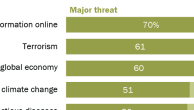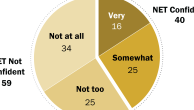Overview
A majority of Americans say that the United States should take North Korea’s nuclear threats very seriously. At the same time, the public is divided over whether North Korea’s leadership is willing and capable of following through on its threats against the United States.

The national survey by the Pew Research Center, conducted April 4-7 among 1,003 adults, finds that 56% say the government should take North Korea’s threats to use nuclear missiles against the U.S. very seriously. Another 27% say the government should take North Korea’s threats somewhat seriously.
About half of Americans (47%) think that North Korea’s leadership is really willing to follow through on its threats against the United States; 41% think North Korea is not really willing to follow through.
Opinion also is divided about North Korea’s ability to make good on its threats: 47% say it is capable of launching a nuclear missile that could reach the U.S. while 43% say it is not capable.
About a third of the public (36%) says they are paying very close attention to news about North Korea’s military threats and plans to restart its nuclear reactor, making this the most closely followed foreign news story of the year. Those who are following news about North Korea’s threats very closely are far more likely than those following it less closely to say that the government should take the threats very seriously (73% vs. 46%).
In addition, far more of those who are tracking North Korean news very closely say the country’s leaders are really willing to follow through on its threats (59% vs. 40% those following less closely).

However, assessments of whether North Korea is capable of reaching the U.S. with a nuclear missile are identical among those who are tracking news about North Korea’s threats very closely and those following the threats less closely (47% each).
Republicans and Democrats have comparable levels of interest in news from North Korea. But Republicans are more likely to say the government should take the threats very seriously (64% vs. 52% of Democrats). More Republicans than Democrats also think that North Korea is really willing to carry through on its nuclear threats (58% vs. 37%).
But partisans express similar views of North Korea’s military capabilities. About half of Republicans (52%) and Democrats (47%) say that North Korea is capable of launching a nuclear missile that could reach the United States.
Few See North Korea as Both ‘Willing’ and ‘Capable’

About a quarter of Americans (28%) see the maximum potential danger from North Korea: They say that North Korea is really willing to follow through on its threat to use nuclear weapons and that North Korea is capable of launching a nuclear missile that could reach the United States.
Roughly the same percentage (25%) expressed the opposite views. They say that North Korea is not really willing to use nuclear weapons against the U.S. and that its nuclear missiles would not be able to reach the United States.
Between those two viewpoints, comparable percentages say that North Korea is willing – but not capable – of attacking the U.S. with nuclear missiles (15%) or that while North Korea is unwilling to follow through on its military threats, it does have the capability to carry them out (13%).

Opinions about how seriously the United States government should take the threat from North Korea differ according to people’s views of its intentions and capability. Fully 83% of those who say North Korea has the will and capability to attack the U.S. think the government should take the threat very seriously. Nearly two-thirds (65%) of those who view North Korea as willing but not capable of attacking the U.S. agree.
Only about half (45%) of those who say North Korea is not really willing to follow through on its nuclear threats – but is capable of launching a missile that could reach the U.S. – view the threats as very serious. And just 29% of those who think that North Korea neither has the will not the capability to attack the U.S. says the government should take North Korea’s threats seriously.




